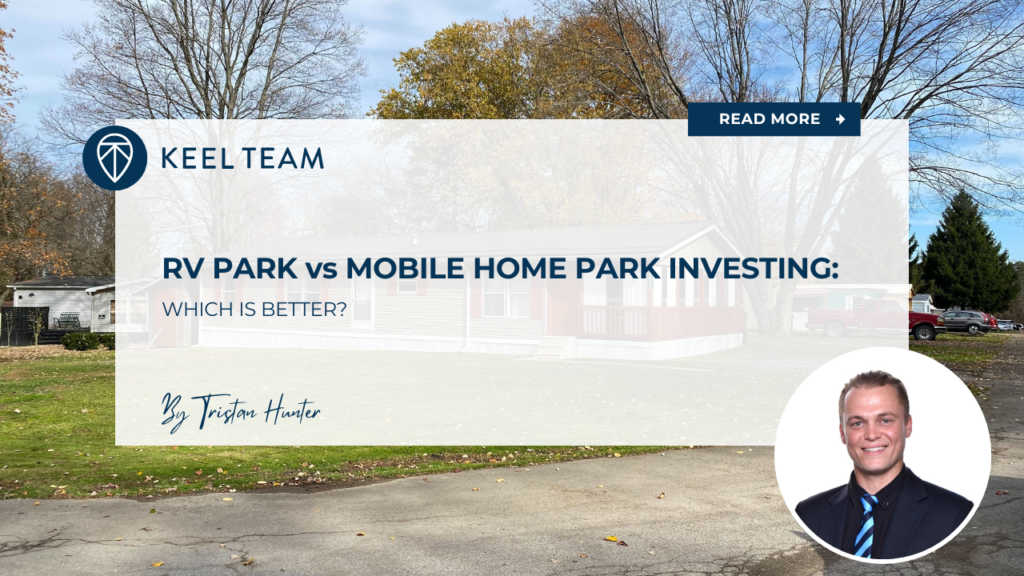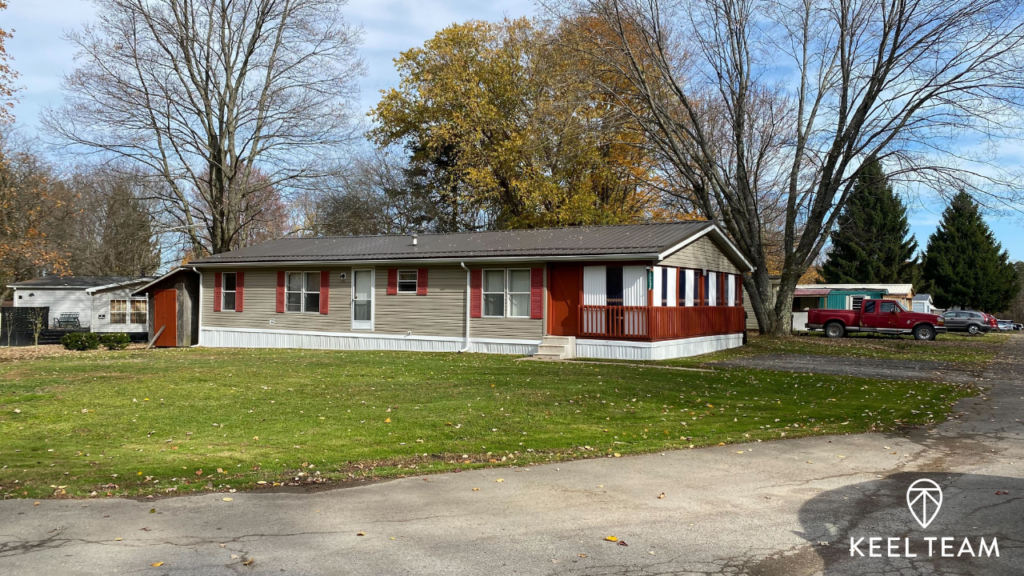RV Park vs Mobile Home Park Investing: Which is Better?
-
 Tristan Hunter - Investor Relations
Tristan Hunter - Investor Relations

Investing in real estate comes with countless options, and two of the most unique asset classes are mobile home parks and RV parks. While they may appear similar at first glance, these investments differ significantly in operations, tenant profiles, and profitability potential. In this article, we’ll compare RV park and mobile home park investing, highlighting their typical pros and cons. We will also touch on what we think is the better overall option to consider.
Understanding Mobile Home Parks and RV Parks
Before diving into the comparison, it’s essential to understand the fundamentals of these asset classes:
- Mobile Home Parks: These are generally land-lease communities where residents own or rent mobile homes but pay lot rent for the land their homes sit on. Mobile home parks often provide utilities, infrastructure, and shared amenities, catering to long-term tenants seeking affordable housing.
- RV Parks: RV parks typically cater to short-term or seasonal tenants traveling for leisure. They offer spaces to park recreational vehicles and often provide utility hookups, shared amenities, and recreational activities.
Pros of Mobile Home Park Investing
1. Stable and Long-Term Tenancy
Mobile home parks often attract long-term tenants. Moving a mobile home can be costly, leading residents to stay in one location for many years. This stability may result in consistent income and reduced tenant turnover, which can help minimize vacancy risks.
2. High Demand for Affordable Housing
The affordable housing crisis in the U.S. continues to grow, making mobile home parks a sought-after solution. Many residents rely on mobile home parks as one of the most cost-effective housing options. This demand might create steady income opportunities for investors.
3. Lower Maintenance Costs
Since tenants typically own their homes, they are responsible for maintaining them. Mobile home park owners primarily manage the land, utilities, and common areas, which may result in lower maintenance costs compared to other real estate investments.
4. Tax Benefits
Mobile home parks often come with significant tax advantages, including accelerated depreciation on infrastructure like roads and utility hookups. These typical benefits might allow owners to offset taxable income more efficiently than other asset classes.
5. Scalability
Mobile home parks allow investors to acquire multiple units on a single property, often streamlining operations and potentially generating higher returns compared to managing single-family rentals.
Download our FREE eBook on the Top 20 things to know BEFORE investing in mobile home parks!
Cons of Mobile Home Park Investing
1. Zoning and Regulatory Challenges
Acquiring and operating a mobile home park often requires navigating complex zoning laws and local regulations. These challenges can make the acquisition process more time-consuming.
2. Reputation and Stigma
Mobile home parks can face a negative perception, which might affect tenant demographics and community reception. Investors often need to work on improving the image of their properties.
Pros of Investing in RV Parks
1. Higher Rental Rates
RV parks often charge higher rental rates per night, especially in tourist destinations. This can lead to high-income potential during peak seasons.
2. Flexible Tenant Base
RV parks cater to a variety of tenants, including vacationers, seasonal workers, and retirees. This flexibility allows owners to target different markets depending on the park’s location and amenities.
3. Lower Entry Costs
RV parks generally require less upfront capital compared to mobile home parks. They often involve smaller lots and simpler infrastructure, making them accessible to new investors.
4. Recreational Appeal
Many RV parks offer amenities like swimming pools, hiking trails, and event spaces. These features can attract a steady flow of tenants and increase revenue opportunities.
Cons of Investing in RV Parks
1. Seasonal Income Fluctuations
RV parks often depend on seasonal tourism, leading to inconsistent income throughout the year. Off-seasons can result in lower occupancy and reduced profitability.
2. Higher Maintenance Demands
Frequent tenant turnover and the wear-and-tear of hosting RVs can increase maintenance costs. Owners may also need to invest in ongoing recreational activities and infrastructure upgrades.
3. Tenant Turnover
Unlike mobile home parks, RV parks experience high turnover rates, as tenants often stay for short periods. This can lead to increased operational efforts and marketing expenses.
4. Economic Sensitivity
RV parks rely heavily on discretionary spending. Economic downturns or rising fuel prices might discourage RV travel, impacting tenant demand and revenue.

Profitability Comparison
When comparing profitability, mobile home parks often offer more stable and predictable income than RV parks. The long-term nature of mobile home park tenancy and the high demand for affordable housing might contribute to consistent cash flow. On the other hand, RV parks rely on fluctuating seasonal income, which could make profitability less predictable.
Additionally, mobile home parks typically benefit from lower operational costs since tenants maintain their homes. This is in contrast to RV parks, where frequent turnover and amenity upkeep can drive up expenses. While RV parks might generate higher gross revenue during peak seasons, the net income may not match the stability of a well-managed mobile home park.
Which is the Better Option?
Why Mobile Home Parks Stand Out
For investors seeking long-term stability and consistent return potential, mobile home parks might be the better choice. Their ability to cater to a growing need for affordable housing, coupled with lower maintenance demands, positions them as a reliable investment.
When RV Parks Might Be a Good Fit
RV parks could appeal to investors who enjoy seasonal markets, tourism-focused regions, or the recreational industry. They may also be a viable option for those looking to diversify a real estate portfolio with higher-risk, higher-reward opportunities.
Factors to Consider Before Choosing
- Investment Goals
- Mobile home parks might suit investors focused on steady cash flow and lower operational risks.
- RV parks could align with those targeting high-yield, short-term revenue.
- Location
- Mobile home parks often thrive in areas with affordable housing demand.
- RV parks usually succeed in tourist destinations and regions with recreational appeal.
- Management Style
- Mobile home parks often require less hands-on management.
- RV parks generally involve more intensive oversight due to high turnover and amenities.
- Economic Sensitivity
- Mobile home parks may be more recession-resistant.
- RV parks might face challenges during economic downturns.
Conclusion
Mobile home parks and RV parks each offer unique opportunities, but from our experience, mobile home parks stand out for their stability, affordability, and long-term income potential. While RV parks might appeal to investors seeking high-yield seasonal returns, mobile home parks could provide more consistent cash flow and lower operational risk potential. Ultimately, the choice depends on your investment goals, risk tolerance, and management preferences. Good luck!
Are you looking for MORE information? Book a 1-on-1 consultation with Andrew Keel to discuss:
- A mobile home park deal review
- Due diligence questions
- How to raise capital from investors
- Mistakes to avoid, and more!
Disclaimer:
The information provided is for informational purposes only and is not investment advice or a guarantee of any kind. We do not guarantee profitability. Make investment decisions based on your own research and consult registered financial and legal professionals. We are not registered financial or legal professionals and do not provide personalized investment recommendations.

Tristan Hunter - Investor Relations
View The Previous or Next Post
Subscribe Below 👇





